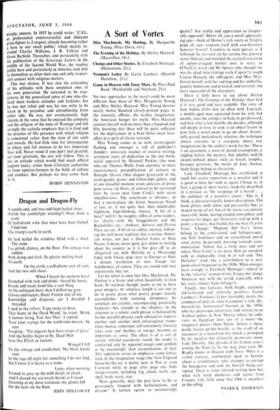Remote Effectual Don
The Letters of C. S. Lewis. Edited by W. M. Lewis. (Bles, 30s.) IN January 1917 C. S. Lewis wrote to his brother, 'Oxford is absolutely topping, and I am awfully bucked with it.' This does not sound the tone of voice to encourage the reader through a :substantial volume of letters; but the whole is greater than the parts and gradually the power- ful self-knowledge and clarity, the honesty and the love which are known to most through his books, establish themselves. In 1922 he wrote, 'I think I know my limitations and am quite sure that an academic or literary career is the only one in which I can ever hope to go beyond the meanest mediocrity.' Certainly he was a natural don, though not an ambitious or particularly successful one. And it was some other man inside him that started him writing poetry while still very young—an imaginative man whom, in 1954, he acknowledged to be more basic than either the religious writer or the critic. We know from his own autobiography that his external life was unremarkable except for his marriage, but an uneventful life has never yet held back a natural writer or poet. '
In Lewis's case the limitations of being a don at Oxford were fairly dire—a first visit to Cam- bridge is encountered as if a Thesiger had dis- covered a new desert tribe and without any sense of self-mockery. Later he could write of Cowper : 'All these cucumbers, books, parcels, tea-parties, parish affairs. It is wonderful what he makes of them.' He himself made little of everyday ex- periences and everything of the people he knew and wrote to. But what always surprised him, the accident that gave him his reputation was, simply, success. In 1937 he could write : `C.S.L. as professional controversialist and itinerant prize-fighter is, I suspect, already becoming rather a bore to our small public,' which mainly in- cluded Charles Williams, J. R. Tolkien and Owen Barfield. Thereafter, and particularly with the publication of the Screwtape Letters in the middle of the Second World War, the reading public here and particularly in America took him to themselves as often their one and only respect- able contact with religious matters.
This was chance. It was also the coinciding of his attitudes with those unspoken ones of his own generation. He reckoned to be reac- tionary, in the generalised sense of one who dis- liked most modern attitudes and fashions; but be was not rabid and was far too witty to be taken in by prejudice and attitudinising from either side. He was, not ostentatiously, high church, in the sense that he enjoyed the company and the religion of the nuns of Wantage and felt strongly the catholic emphasis that it is God and the practice of His presence with which religion is concerned rather than the state of our souls and morals. He had little time for introspection in others and felt motives to be less important than will. Never mind if you don't feel grateful; act your gratitude, the rest will follow. This is not an attitude which would find much official support today, either from Christian authorities or from opinion-formers in the fields of culture and conduct. But perhaps we may come back to it.
ROBIN DENNISTON



































 Previous page
Previous page